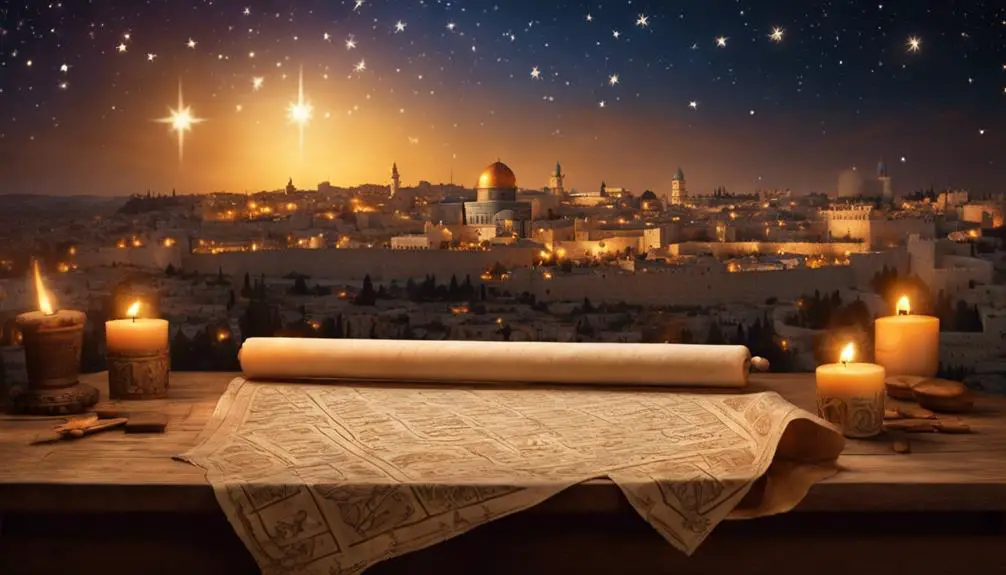Discover the profound symbolism of the number 24 in the Bible and its celestial connection, urging you to delve deeper into its mysteries.

What Does the Number 24 Represent in the Bible
Did you know that the number 24 appears numerous times throughout the Bible, imbued with significant symbolism and purpose?
You might find it intriguing that this number is closely associated with the 24 elders seated around the throne in Heaven, a detail that sparks curiosity about its deeper meaning.
This figure also ties into the divisions of priests and their duties in temple services, shedding light on its importance in biblical worship and prophecy.
To uncover the layers of symbolism behind the number 24 and its impact on heavenly worship and biblical teachings, one must explore the context and stories that give this number its weighty significance.
Key Takeaways
- The number 24 symbolizes the unity of God's people through the representation of 24 elders in heavenly worship.
- It signifies divine leadership and spiritual governance, reflecting the roles of elders and their participation in divine adoration.
- The number is intricately linked with the structured service in the temple, embodying spiritual leadership and collective worship.
- In biblical prophecy, 24 is associated with heavenly worship and the end times, offering insights into divine plans and spiritual truths.
The 24 Elders Explained

In the context of biblical symbolism, the 24 elders represent a significant and multifaceted concept, embodying the unity of God's people across both the Old and New Testaments. The number 24, intrinsically linked with elder roles, carries profound spiritual significance, serving as a bridge between two covenant communities. These elders aren't just figures of reverence; they're emblematic of a broader, divinely ordained leadership structure, integral to the spiritual governance and guidance of God's people.
Analyzing their roles further, you'll find that these elders aren't merely symbolic placeholders. They're active participants in heavenly worship, demonstrating the continuous and communal nature of divine adoration. This reflects a heavenly pattern for earthly worship, where the congregation of believers joins in a perpetual acknowledgment of God's sovereignty. The spiritual significance of their roles extends beyond their immediate actions; it's a testament to the collaborative and eternal relationship between God and humanity. Through their presence and actions, the 24 elders encapsulate the essence of spiritual leadership and collective worship, underscoring the unity and continuity of God's covenant community across ages.
Priests' Divisions and Duties

ARTICLE TITLE: Meaning of the Number 24 in the Bible
PREVIOUS SUBTOPIC: 'The 24 Elders Explained'
CURRENT SUBTOPIC: 'Priests' Divisions and Duties'
Delving into the organizational structure of the priesthood reveals a meticulously designed system, where the divisions and duties of priests play a pivotal role in maintaining the spiritual integrity and operational efficiency of temple worship. Originating from the Levitical lineage, these priests were adorned in ceremonial garments, symbolizing purity and divine service.
To make this writing more engaging, consider the following table outlining the divisions and selected duties:
Division |
Duty |
|---|---|
1st Division |
Offer sacrifices |
2nd Division |
Maintain the temple's sanctity |
3rd Division |
Lead worship and prayers |
4th Division |
Instruct in the Law |
Each division, structured around the Levitical lineage, carried out specific duties critical to the spiritual life of the community. The ceremonial garments they wore were not just attire but served as tangible reminders of their sacred responsibilities. Analyzing these aspects offers a profound insight into how the divisions and duties of the priests were pivotal in facilitating a seamless operation within temple worship, ensuring that every aspect of their service was performed with the utmost reverence and dedication.
Symbolism in Temple Services

Delving into temple services reveals a rich tapestry of symbols, each meticulously woven to embody spiritual truths and divine mysteries. Temple architecture and sacrificial rituals stand as profound expressions of the divine-human relationship, encapsulating themes of atonement, purification, and divine presence.
Temple architecture, in its elaborate design and sacred spaces, mirrors the cosmos's structure, reflecting heaven on earth. It's a physical manifestation of the spiritual realm, inviting you into a meditative journey from the outer courts of daily life into the Holy of Holies, where the Divine's presence was believed to dwell.
Sacrificial rituals, with their intricate procedures and profound symbolism, articulate themes of repentance, renewal, and communion with God. These acts of devotion weren't mere formalities but deeply emotive expressions of faith, surrender, and the desire for reconciliation with the Divine.
- The burning of incense symbolized prayers rising to heaven, a fragrant remembrance of humanity's earnest supplications.
- The lighting of the menorah represented divine illumination, guiding the faithful through spiritual darkness.
- The showbread laid out weekly signified God's provision, a continual reminder of sustenance and care.
In these practices, you encounter a spirituality that's both transcendent and immanent, pointing to a reality beyond the physical yet intimately connected with the daily rhythms of faith and devotion.
Crowned With Heavenly Worship

Exploring the concept of heavenly worship, one discovers a realm where the faithful are crowned with divine communion, transcending earthly constraints through spiritual devotion. This sacred space is meticulously structured, much like the angel hierarchy, suggesting an order that's both celestial and profoundly significant. The Bible's depiction of heavenly worship isn't merely about adoration; it's a revelation of the intricate relationship between celestial beings and human worshippers.
Delving deeper, you'll notice that this hierarchical arrangement mirrors the meticulous organization within the spiritual realm. It's not just about the angels' positions; it's about their roles in facilitating a connection between the divine and the mortal. The angel hierarchy serves as a bridge, enabling worshippers to draw nearer to the divine essence through their intercessions and praises.
This concept of being 'crowned' with heavenly worship underscores the honor bestowed upon those who engage in this holy communion. It's a metaphorical crowning, reflecting the spiritual elevation and enlightenment one achieves. Through understanding and participating in this celestial worship, you align yourself with the angelic choir, uniting in a symphony of devotion that transcends the physical, anchoring you firmly in the spiritual.
Insights From Biblical Prophecy

Biblical prophecy offers a profound window into the divine plan, revealing the intricate ways in which historical and future events are interwoven with spiritual truths. As you delve deeper into the scriptures, you'll uncover that the number 24, often associated with heavenly worship and order, also finds its significance within the realm of end times and apocalyptic visions. This symbolism isn't merely coincidental but serves as a divine marker, guiding believers through the complexities of prophecy.
- *The anticipation of end times evokes a deep sense of urgency and solemnity, reminding us of the finite nature of our earthly existence.*
- *Apocalyptic visions, though shrouded in mystery, provide a glimpse into the culmination of God's plan, stirring both awe and reverence.*
- *The intertwining of numbers like 24 with prophetic messages underscores the precision and intentionality of divine communication.*
Analyzing these elements through a scholarly lens, it becomes evident that biblical prophecy, far from being abstract or speculative, is a meticulously structured narrative. It invites you into a rich tapestry of divine foresight and human history, where every detail, including the number 24, plays a pivotal role in unfolding the eschatological drama.
Frequently Asked Questions
How Does the Number 24 Relate to the Concept of Time in the Bible, Particularly in the Context of the New Testament?
In analyzing the New Testament, you'll find that the number 24 subtly underscores the importance of time divisions, particularly reflecting the day-night cycle.
This numerical representation isn't just arbitrary; it echoes the structured passage of time that's crucial in biblical narratives.
The 24-hour cycle, deeply ingrained in daily human experience, is mirrored in these texts, highlighting the rhythm and order that govern both celestial and earthly realms in a profound, symbolic manner.
Are There Any Significant Events or Figures in the Bible Associated With the Age of 24, Outside the Context of Priesthood and Prophecy?
You're exploring age significance and historical events in the Bible, specifically related to the age of 24, beyond priesthood and prophecy.
While the Bible doesn't explicitly highlight figures or events at this exact age, it's crucial to analyze textual nuances and cultural contexts.
This age doesn't stand out prominently like others, suggesting its significance might be more subtle, woven into the broader tapestry of biblical narratives rather than spotlighted through specific events or individuals.
How Is the Number 24 Reflected in the Structure or Organization of the Early Christian Churches, if at All?
In exploring early Christian church governance, you'll find that the number 24 isn't directly linked to its structure.
However, the concept of Apostolic tradition, which is foundational to church organization, emphasizes a collective of leaders rather than a specific number.
This approach reflects a focus on unity and continuity with the teachings of the Apostles, rather than adhering to symbolic numbers for organizational purposes.
Beyond the Specific Symbolism of 24 Elders, Priests, and Temple Services, Does the Number 24 Have Any Implications for the Moral or Ethical Teachings in the Bible?
You're exploring whether the number 24 influences moral or ethical teachings in the Bible, beyond its symbolic usage. It doesn't directly shape ethical dualism or act as a moral compass in scripture.
Instead, the number's symbolic representation in structures like the 24 elders points towards a broader divine order and harmony. This indirectly supports ethical teachings by underscoring the importance of balance, order, and accountability in upholding moral principles.
Can the Number 24 Be Linked to Any Specific Psalms or Proverbs, and if So, How Do These Passages Contribute to the Overall Understanding of the Number's Significance in Biblical Literature?
You're exploring if the number 24 connects to specific Psalms or Proverbs, aiming to unravel its significance. By examining wisdom themes and literary patterns, you'll find that while direct links may not always be evident, the broader context of these texts can deepen your understanding of 24's symbolism.
Insightful analysis of such passages can reveal layers of meaning, enhancing your appreciation of biblical literature's complexity and its nuanced approach to numbers.
Conclusion
In analyzing the biblical significance of the number 24, you uncover a profound spiritual architecture. This number isn't arbitrary; it embodies the completeness of heavenly governance and worship.
Through the 24 elders, the divisions of priests, and the intricate symbolism in temple services, you witness a divine order that mirrors celestial realities.
These elements, crowned with heavenly worship, offer you a glimpse into the eternal, revealing the meticulous care with which God structures both heaven and earth, inviting deeper reflection on divine mysteries.



Sign up